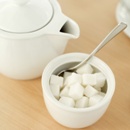Excerpt: Body Intelligence: Lose Weight, Keep It Off, and Feel Great About Your Body Without Dieting!
Supersize That?
The idea that eating a large amount of food is an accomplishment has been taken to the limit by Takeru Kobayashi and more than three thousand of his colleagues. Kobayashi is the ultimate “big eater.” A twenty-five-year-old from Japan, he holds the world record for eating 50.5 hot dogs and buns in twelve minutes (that’s 15,600 calories and more than one thousand grams of fat). He is the winner of the Nathan’s Famous Hot Dog Eating Contest, an event “sanctioned” by the International Federation of Competitive Eating, which oversees 150 similar contests. But you don’t have to try to be a competitive eater, or even an ordinary big eater to do major damage to your weight-control efforts. Eating too much has become a commonplace occurrence.
When you place your order at a fast-food drive-up window, you’ll be encouraged to order a larger portion of the foods you want. The practice of supersizing has spread from restaurants so that the portions served in meals at home are also getting bigger. A study comparing average portion size in 1996 with 1977 portions found that homemade cheeseburgers were 25 percent larger and contained an additional 136 calories, Mexican food servings increased by 133 calories, and desserts by 55 calories. According to a study reported by the Centers for Disease Control and Prevention, American women are eating 300 more calories each day than they did twenty years ago. Men are consuming 168 additional calories.
What happened during the last twenty years to make us believe that we needed all this extra food to make us feel full? Some of the credit goes to a business executive who was trying to increase sales of soda and popcorn in movie theaters. People wouldn’t buy more than one bag of popcorn, even when he offered two-for-one deals. Apparently eating two bags of popcorn seemed piggish, but when he offered a single jumbo popcorn serving or an extra large soda it became more acceptable to consume huge quantities of food.
Most people consuming all of their extra large drinks and supersized fries assume that they must be hungry and need the larger portions. Research suggests that any reported hunger is based on external cues, mostly seeing the food in front of you, rather than on any physiological signal that more food is required. A 2004 University of Illinois study demonstrated that people ate more just because they had larger portions. Dr. Brian Wansink had students come to his laboratory to participate in a taste test of tomato soup. Some of the students had trick soup bowls rigged with hidden tubes that kept the bowls full. These students ate 40 percent more soup. Apparently their eating was determined by the presence of food in front of them rather than any internal hunger cues.
In another study Dr. Wansink demonstrated that large portions lead to increased eating even when the food wasn’t very good. Moviegoers were given stale, two-week-old popcorn. Half of the moviegoers got a regular-sized container, while half got jumbo buckets. The moviegoers reported that the popcorn tasted terrible, but those with the jumbo buckets ate 33 percent more anyway, even though they didn’t like what they were eating. What these findings suggest is that if you can be persuaded to buy a larger quantity of food, perhaps because it seems like a “good deal” or because you’re afraid that you’ll be hungry later, you’ll eat the whole thing even if you aren’t hungry and it doesn’t taste very good.
Ruth was a fifty-two-year-old retired schoolteacher who weighed 160 pounds and loved ice cream bars. Since this was her favorite treat, I was not going to tell her she should give them up. Instead I suggested that she limit her intake to one per day, rather than the three she usually ate. I encouraged her to make ice cream eating a “pure” experience. She should not do anything else while eating, focus all her attention on the sensory qualities of eating, and pause for two minutes after each ice cream bar before starting the next. At the following session she told me that most days she was satisfied with one ice cream because, during the pause, “I became involved in something else and forgot about it.”
Reprinted from Body Intelligence: Lose Weight, Keep It Off, and Feel Great About Your Body Without Dieting! By Edward Abramson, Ph.D. Copyright © 2005 Edward Abramson, Ph.D. Published by McGraw-Hill; July 2005;$21.95US/$28.95CAN; 0-07-144206-5.
-
Working Out With A Sports Injury
A sports injury can be one of the most d
-
3 Lessons From The Biggest Loser
All over the world, night after night, millions of people are riveted
-
One Of The Key Secrets To LifeLong Leanness
One of the things that I do on a regular basis to help me continually
-
Dont Believe Everything You Read
Obesity and being over weight is a bigge
-
Despite Obesity Epidemic, Children Opt Out of Gym Class
It is not news to us that the United States is suffering from an ob
-
Weight Loss Program - A Guide For Weight Loss
How people lose weight varies from one individual to the next. Some p
- DON'T MISS
- So Long, Scale!
- Hollywood Weight Loss Secrets Five Things To Avoid
- Elite Natural Supplements for Weight Loss:Drop Unwanted Pounds Intelligently with the BestWeight Loss Supplements for Men & Women
- 5 Diet Blunders You Must Avoid
- Cabbage Soup Diet For Dieters Who Dont Like Cabbage
- Weight Loss Planning To Lose Or Preparing To Fail
- My Journey To Finding Me
- How To Find Your Ideal Body Weight
- Checklist For Effective Weight Loss Via Reviews
- Eat Candy and Lose Weight!




